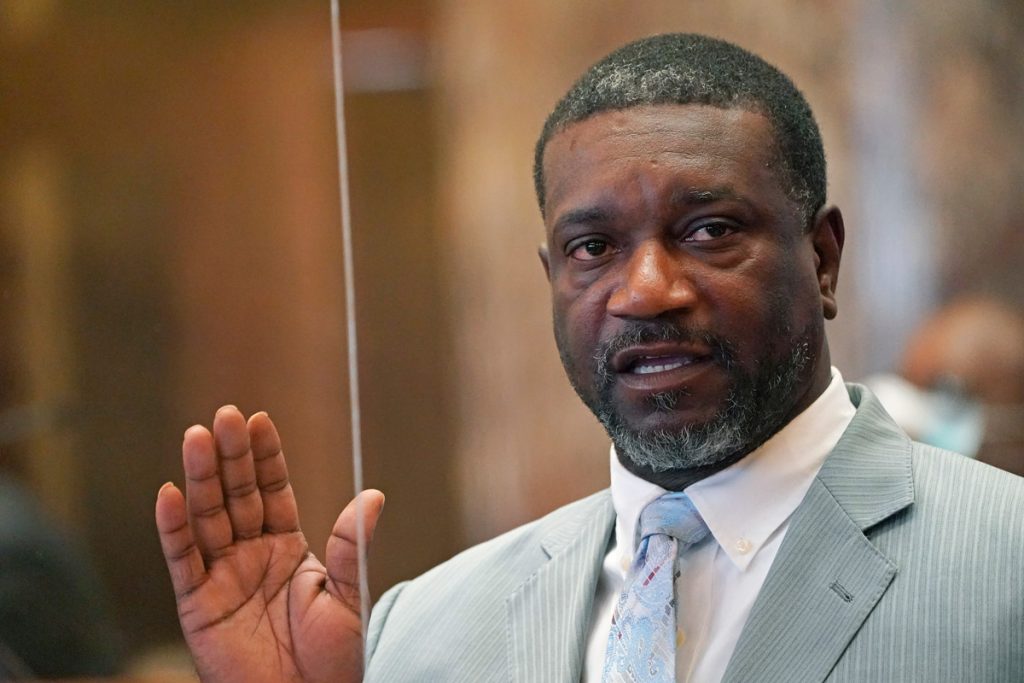Criminal-justice reform for Mississippi is on life support, with only one bill left alive out of a slate of ambitious proposals to reduce the state’s prison population. As the last days of the 2021 legislative session quickly expire, long-sought efforts to achieve criminal-justice reform through the softening of stiff automatic penalties and expansions in parole eligibility look less and less likely to pass due largely to the late-hour dissension of the state’s law-enforcement organizations.
The surviving parole reform bill has been the centerpiece of that effort, but with opposition emerging from the same law-enforcement organizations that killed it in 2020, Gov. Tate Reeves may be poised to close the book on another legislative session without meaningful progress toward reform that many across parties say Mississippi’s system seriously needs.

Sen. Juan Barnett, D-Heidelberg, chairman of the Senate Corrections Committee and a leading figure in the Legislature’s bipartisan criminal-justice reform effort, could not contain his frustration in an afternoon interview with the Mississippi Free Press today, asserting that the state’s law enforcement representatives had been included at every step of decision-making.
“We’ve worked with them as best we could,” Barnett said. “At this point, I’m tired of giving and giving while they keep moving the bar.”
Habitual Offender Reform Dead, Parole Bill Alive
Already dead is a House effort intended to revise the state’s habitual-offender laws. Currently, anyone convicted of three consecutive, unrelated felonies—with any one of those felonies being a crime of violence—triggers the state’s strict habitual-offender laws, carrying an automatic life sentence.
House Bill 796 would have introduced a time limit on those penalties, requiring all three unrelated crimes to have taken place in the same 15-year period. Originally, the bill further restricted the trigger for the habitual-offender penalties, requiring the final felony that carried the life sentence to itself be a crime of violence, from an extensive list of offenses, including indirect forms of violence and sexual crimes.
But parole reform—contained in Senate Bill 2795, still lives, at least for the moment. The key reforms in S.B. 2795 would add a 10-year cap on parole eligibility for non-violent offenders, meaning they would be eligible for parole hearings at 10 years of incarceration or 25% of their sentence, whichever is less.
Additionally, the core of the debate over the bill lies in the expansion of parole eligibility to certain violent crimes, allowing incarcerated Mississippians guilty of specific violent offenses the opportunity for parole at 60% of their time served.
Meantime, nearly all of the neighboring southern states, in fact, allow parole eligibility for people convicted of serious and violent offenses. For example, FWD.us reports, “people convicted of serious and violent offenses in Arkansas become eligible for parole after serving between 33% and 70% of their sentence. In Texas, those individuals become eligible for a parole hearing after serving 50% of their sentence or 30 years, whichever comes first.”
Due in parts to high costs of denying parole, the State of Mississippi has been attempting some sort of parole reform since 2008. But it hasn’t gone far enough, FWD.us argues in its report. “While these measures have restored incentives and hope to many behind bars, the vast majority of people in prisons across the state–more than 12,000 individuals–remain ineligible for a parole hearing.”
This session, Sen. Barnett has remained adamant that addressing Mississippi’s high prison population—roughly 19,000 in its state prisons—required accessible parole eligibility, which guarantees only a hearing before the parole board, not release.
“The House and I agreed on 60% (of time served). We think that’s a fair amount,” Barnett said.
The most current estimates of Mississippi’s enormous prison population ranks the state as the nation’s second highest incarcerator. Mississippi’s prison population of 652 per 100,000 is higher than that of any individual nation.
Representatives of the Mississippi Prosecutors Association and the Mississippi Sheriffs’ Association took issue with the inclusion of crimes such as murder, armed robbery, carjackings and drive-by shootings in the parole legislation.
Those objections, among others, led Gov. Tate Reeves to veto last year’s attempt at similar parole reforms, found in Senate Bill 2123.
“We didn’t know exactly what direction the bill was going, so we elected as an association to draft a position paper,” Hal Kittrell, co-chair of the legislative committee for the Mississippi Prosecutors Association, explained in a March 31 interview with the Mississippi Free Press.
“We wanted to give some clarity as to what we can live with, if we gotta live with something,” Cherie Wade, president of the MPA, explained in the same interview.
The debate over the minutiae of parole form has shifted rapidly, leaving many observers with outdated or inaccurate perceptions over what is on the table. A perfect example is the repeated appearance of sex offenders in the broader discussions of the parole reform bill. An expansion for parole eligibility for sex offenders has never been on the table.
“Of all the things that we’ve agreed on the most, never has there been any discussion … that sex offenders would have parole eligibility.” Kittrell said.

When the parole-reform bill finally emerged from conference, some of the MPA’s demands had been met: murder in the first and second degree were no longer on the list of parole-eligible violations.
But some key requests from the state’s prosecutors were still missing. Wade explained to the Mississippi Free Press that armed robbery was the top sticking point.
“We’re not in favor of early parole or release, especially without any rehabilitation programs, (for violent offenders.) But we knew that the most violent of those offenders, including the armed robberies … we had to hold the line on that,” Wade said.
Another sticking point for the MPA is the retroactive nature of parole eligibility.
“We have, for all these years, been talking with our victims (of violent crimes), and one thing they ask is ‘when will (their offender) be released?’ And we’re saying, well, as you know, the law says there is no parole eligibility (for violent crimes) here. They have had great comfort in that fact,” Kittrell said.
“With this bill being retroactive back to 1995, we are going to have to approach the victims and say, listen, there’s parole eligibility now,” he added.
‘I’ve Always Invited Everybody to the Table’
People working for changes in the system cited a lack of consensus and communication between reform-minded legislators in both parties and law-enforcement leadership as the cause for the bill’s veto in 2020.
Sen. Barnett, whose own father was the victim of homicide early in his life, explained today that he had gone to great lengths to include the law enforcement agencies that contributed to the original bill’s demise last year. But in spite of the increased role both the state’s sheriffs and prosecutors played in the drafting of SB 2795, representatives from both organizations said they could not support the bill in its current form.
Jasper County Sheriff Randy Johnson, president of the Mississippi Sheriffs’ Association, said the organization had not called for a formal vote on support for the bill. But he rejected it personally, and said he’d yet to speak with any sheriffs who approved of the bill in its current form. “I can’t find anybody, any sheriffs, that are fully in agreement with the way this (bill) is,” Johnson told the Mississippi Free Press today.
The statement is virtually a mirror image of the conversation Johnson had with this reporter last year, when pushback from the MSA and the MPA cut the bill down at the governor’s desk.
“I’ve always invited everybody to the table. As a matter of fact, when we passed the final report, I let them know that it had been filed,” Barnett said. But the Democratic senator said real measures were needed to pull the state away from a growing carceral crisis.

“We’ve got a corrections budget that is out of sight. We keep wanting to incarcerate people from 20 years ago for committing armed robbery for 10 bucks. We’re gonna incarcerate this individual for 30 years, at $30,000 a year, for $10 dollars. You tell me what sense that makes.”
Barnett declined to speculate how the governor would react to the bill when it reached his desk. But he stressed that he believed there were prosecutors and sheriffs who supported the process of reform.
After a dense, difficult session likely to end this week, the senator sounded weary, especially now that he finds himself in a repeat of last year’s reliance on gubernatorial support for his bill over familiar naysayers. “This was a bipartisan effort from start to finish. I feel that should be noted,” Barnett said.
Indeed, the bill passed 90-27 in the House and 35-13 in the Senate, with significant support from both parties. But just as last year, it is unlikely that it could survive a gubernatorial veto if one emerges.
“We’ll talk about it when we see what happens,” Barnett said.









